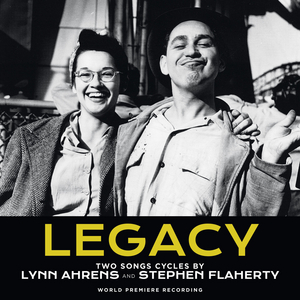BWW Album Review: Ahrens & Flaherty's LEGACY Is a Truly Heartfelt Tribute
Two never-before-heard song cycles make their debut.

Bright spots in 2020 have been few and far between, but a previously-unreleased pair of song cycles from Lynn Ahrens and Stephen Flaherty is definitely one of the year's unexpected highlights. Their new album, Legacy, shares two song cycles recorded years ago but never publicly released before. Both cycles, 1859: A Farmer's Diary and A Boy with a Camera, are a little more conversational and rough-around-the-edges than what you might expect from this iconic duo, but that's not a bad thing; if anything, it makes the songs and characters feel even more immediate and more alive.
The first half of the album is 1859: A Farmer's Diary, based on excerpts from the meticulous, moving diary of a nineteenth-century New York farmer named Philo Blinn. Recorded back in 2004, the cycle features Jason Danieley as Philo Blinn and the late, wonderful Marin Mazzie as his wife Helen. Each of the twelve tracks covers one month, depicting a full year of their life together. Ahrens's lyrics are rather conversational, capturing what one images the real rhythms of Blinn's writings must have been like, rather than perfectly polished rhymes and turns of phrase. Philo himself seems to speak (and sing, in Flaherty's intriguing melodies) with a rougher, more unfinished sound, while Helen's songs are a little more elegant, a little more interior, a little more "finished," so to speak. It's a lovely way of depicting these two characters and their separate but harmonious voices, and no one could sing them like Danieley and Mazzie.
It becomes clear quickly that both Philo and Helen are struggling in their own ways. Philo laments a difficult sale with a neighbor in "January (I Am Not Admonished)" and the frustration of balancing "business" with actual farming in "May (Matters Are Thickening)". Meanwhile, Helen quietly recalls all the things she used to enjoy in the resigned "February (Our Shoulders to the Wheel)" and muses on the possibilities of hope in "April (Snow)."
What starts out as a fairly expected story of the struggles of farm life, though, eventually gives way to a surprisingly strong-willed portrait of a couple facing tragedy and trying to make sense of a society that seems to think very differently than they do. As time goes on, there's more and more of the Blinns' prayers woven seamlessly into the music, especially to Helen's songs, underwriting their unshakeable faith even in the face of illness and tragedy when fall rolls around. That same faith, though, does not go uncriticized: "August (Camp Meeting)" politely criticizes the "revival" style of overwrought traveling preachers, while "November (Our Minister Believes)" rips into the hypocrisy of Christians who defended slavery. What makes these moments all the more powerful is the realization that these people really existed and wrote down these thoughts. By the time the tragic and hopeful "December (An Unexpected Gift)" arrives, you feel as if you truly understand a bit more about the Blinns.
The second half of the album is even more personal: A Boy with a Camera is inspired by the photography of Carroll Siskind - Ahrens's father. The premise is simple: snapshots (if you'll pardon the pun) of moments on the streets of New York City, with Steven Pasquale and Sarah Uriate Berry taking on the role of several different city folk. The words are vivid; the music equally so, painting a glorious and well-focused picture of individual moments and vignettes.
"Columbus Circle" pays tribute to the bustle of a busy corner where a preacher shouts out the word of God - or, at least, something along those lines. It sets the style for the song cycle: songs that don't have much for a "plot," so to speak, but instead consider the inner lives and histories of the people in these photos. Nowhere is that more exquisitely expressed than "Just Beyond the Frame," which pulls together the lives of several photographed women and imagines the richness of their lives and personalities. "Women's lives are never ending / When you think of what's extending / Just beyond the frame," goes the song's last line, and what a beautiful, powerful image that is.
More than anything, there's a love for New York itself, something that feels more important than ever in a year that's put the city through the wringer. It's important to hear the joyful voices of a young couple enjoying a "Windy Day on Coney Island" and the tribute to the workers who made - and make - the city in "Rising City."
The two most personal-feeling songs also are among the most powerful. There's "A Boy with a Camera," which depicts the boy whose lens captures all the other stories - presumably, Siskind. It's a touching tribute to the man behind the camera and to the magic of photographs overall. Finally, the album closes out with "Something Beautiful," a stunningly lovely meditation on beauty, life, and legacy that, sung by Mazzie, becomes all the more poignant. "I was put here to make something beautiful before I go," she sings, and yep, that's a tear in your eye. Legacy is something beautiful indeed.
Comments
.png)
|
.png)
|
Videos

